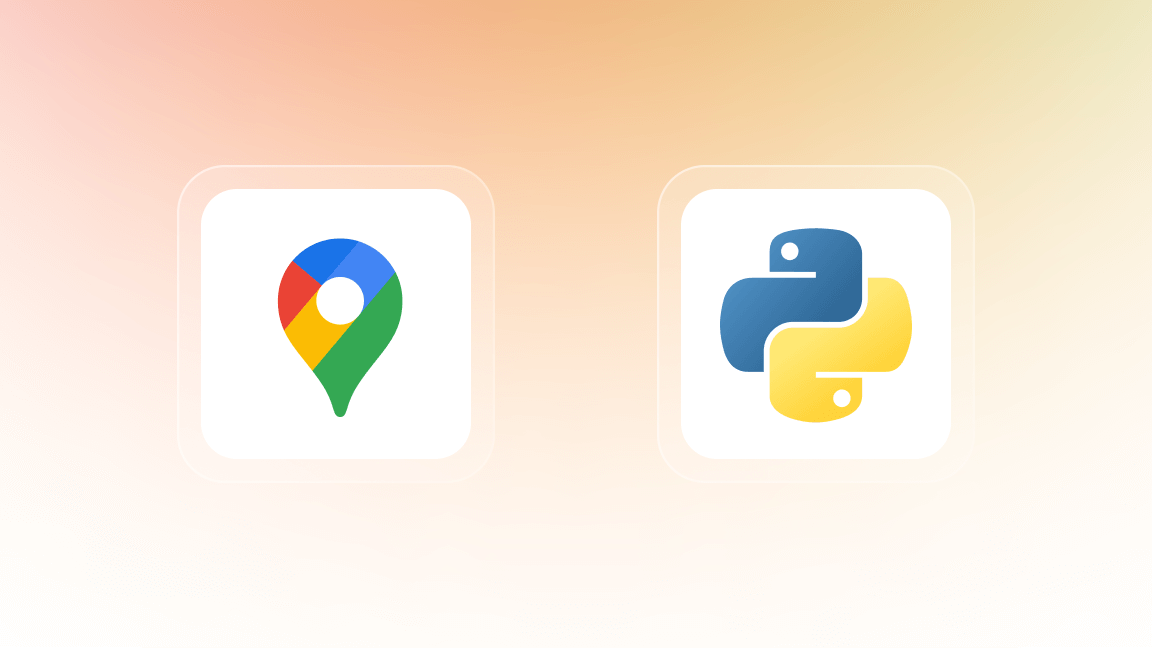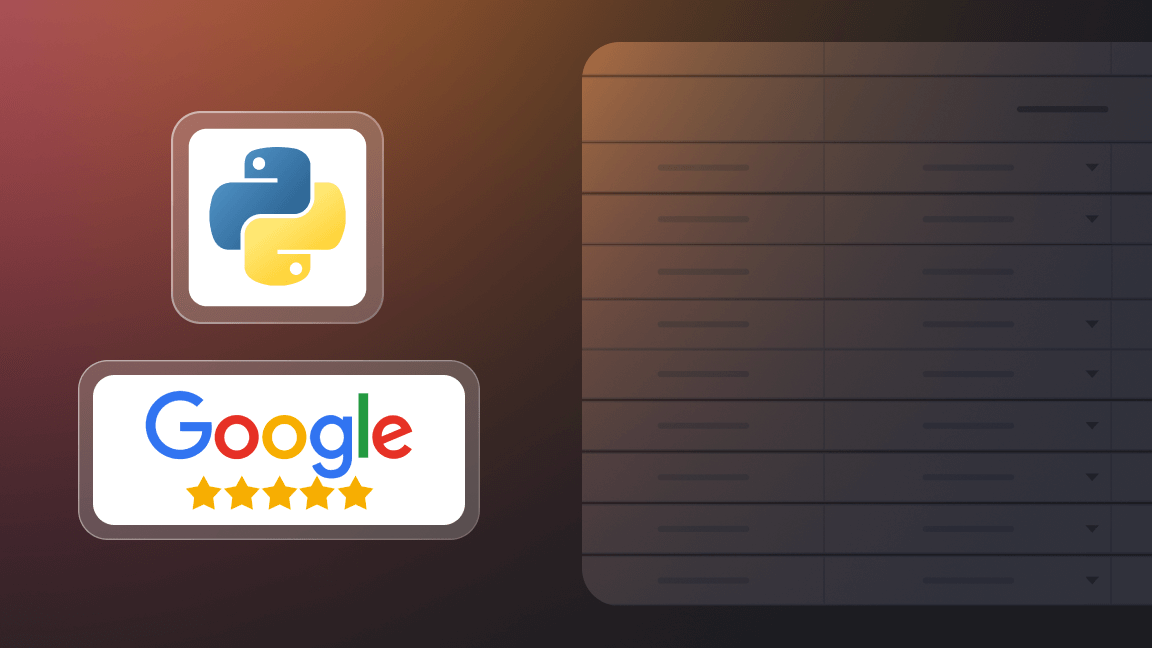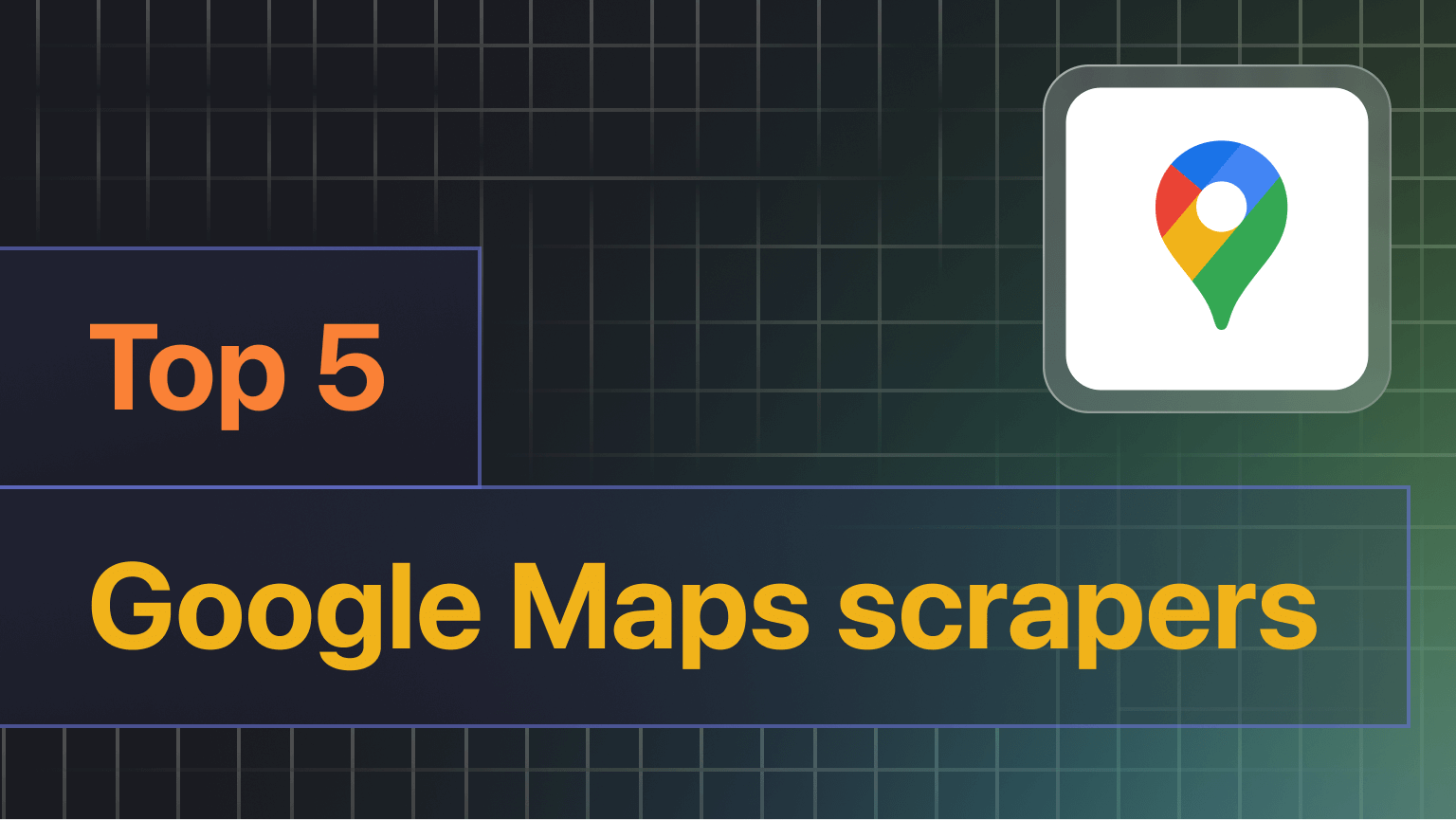Google Scholar is a vast library full of research reports, open-access journals, and scientific literature of any taste and gradient - all just one search away. With the right Google Scholar API or web scraping tool, it’s possible to pull this information into your app or analysis—keeping research, bibliographic data, and citation metrics all in one place. Here are the top Google Scholar APIs for extracting article data effectively.
🎓 Is there an official Google Scholar API?
As of 2024, there is no official Google Scholar API. Much like the Google Search API, Google Scholar, a widely used search engine for academic literature, does not offer an official way to retrieve or programmatically access its data. This means that researchers cannot directly query Google Scholar data using Google APIs and have to look for other ways such as web scraping or unofficial APIs.
🔃 Alternatives to Google Scholar API
Because there's no official method for extracting data from Google Scholar, alternative methods, such as web scraping or open-source APIs, have come about. Much like the alternative APIs, web scrapers can navigate to the Google Scholar website, do a simple search query, and then extract the information they receive from the web pages.
The good news is that you don't always have to be a full-on web developer to scrape Google Scholar data efficiently. These days, scraping Google Scholar data to access data such as search results, research papers, scholarly articles, and other academic resources is as available of an option as ever. So let's explore our options.
🌟 The 5 Best Google Scholar APIs (as of 2024)
1. Apify's Google Scholar Scraper

The comprehensive solution. This API would be the easiest way to scrape articles from Google Scholar and transfer them using an API. What the web scraper is going to do is Google Scholar Cite results using the pagination method. It then visits a web page and scrapes the search results. You can download Google Scholar data in 4 different formats (CSV, HTML, JSON, and even as an Excel document in XLS) or push it directly to your next app using an API Endpoint or API Client. You can also easily integrate it with popular third-party platforms or other scrapers and Google Search APIs.
2. SerpAPIs Google Scholar APIs
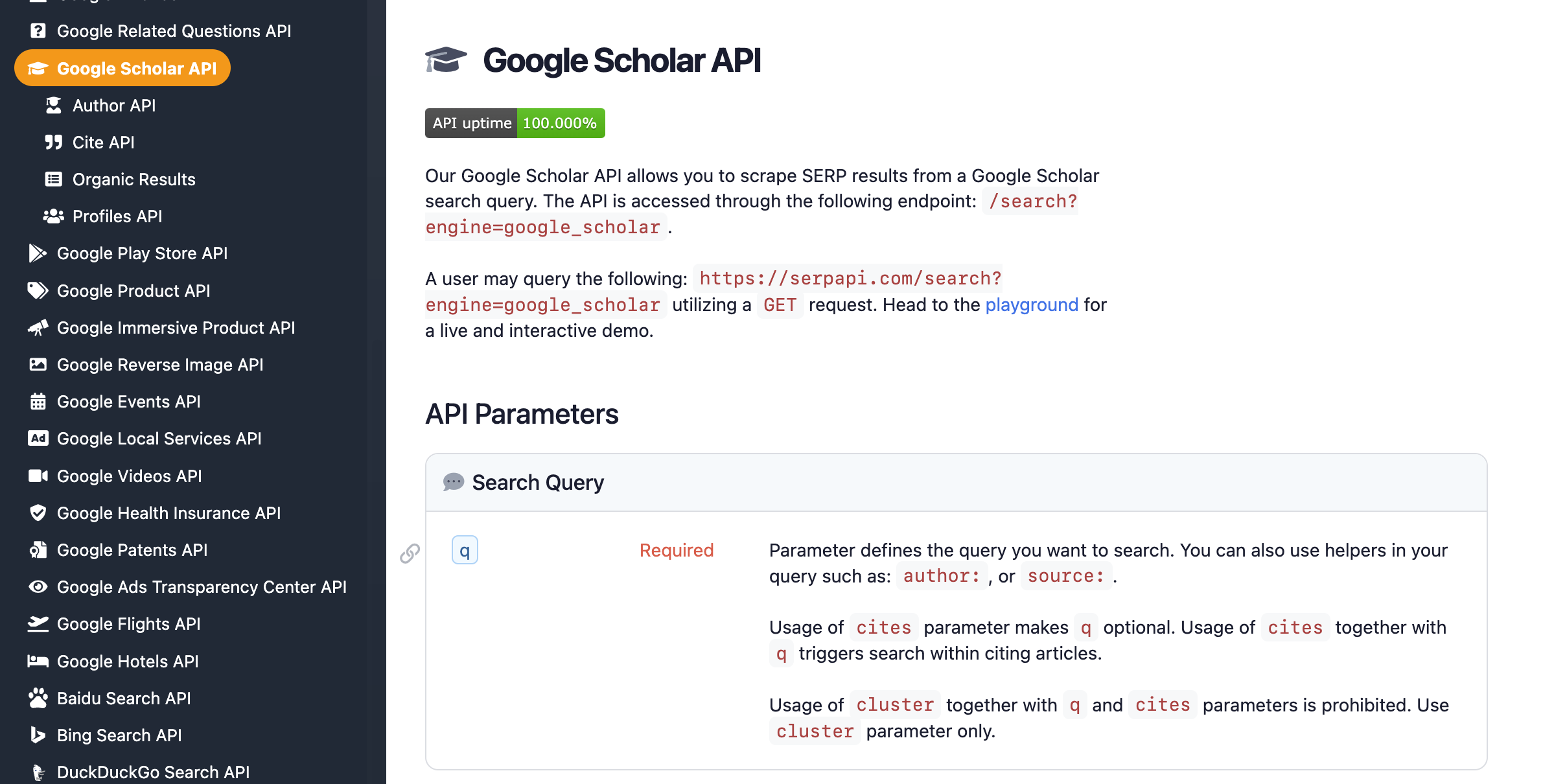
The batch solution. SerpAPI has several API options for scraping research data: Google Scholar Author API, Google Scholar Cite API, Google Scholar Profiles API, and Google Scholar Organic Results API. This API allows you to customize your searches using various parameters like query terms, article IDs for cited by searches, date filters, and language settings. The API provides results in JSON format, so with a little bit of coding, you can get details like titles, links, publication information, and citation data.
3. Scholarly Google Scholar Search API
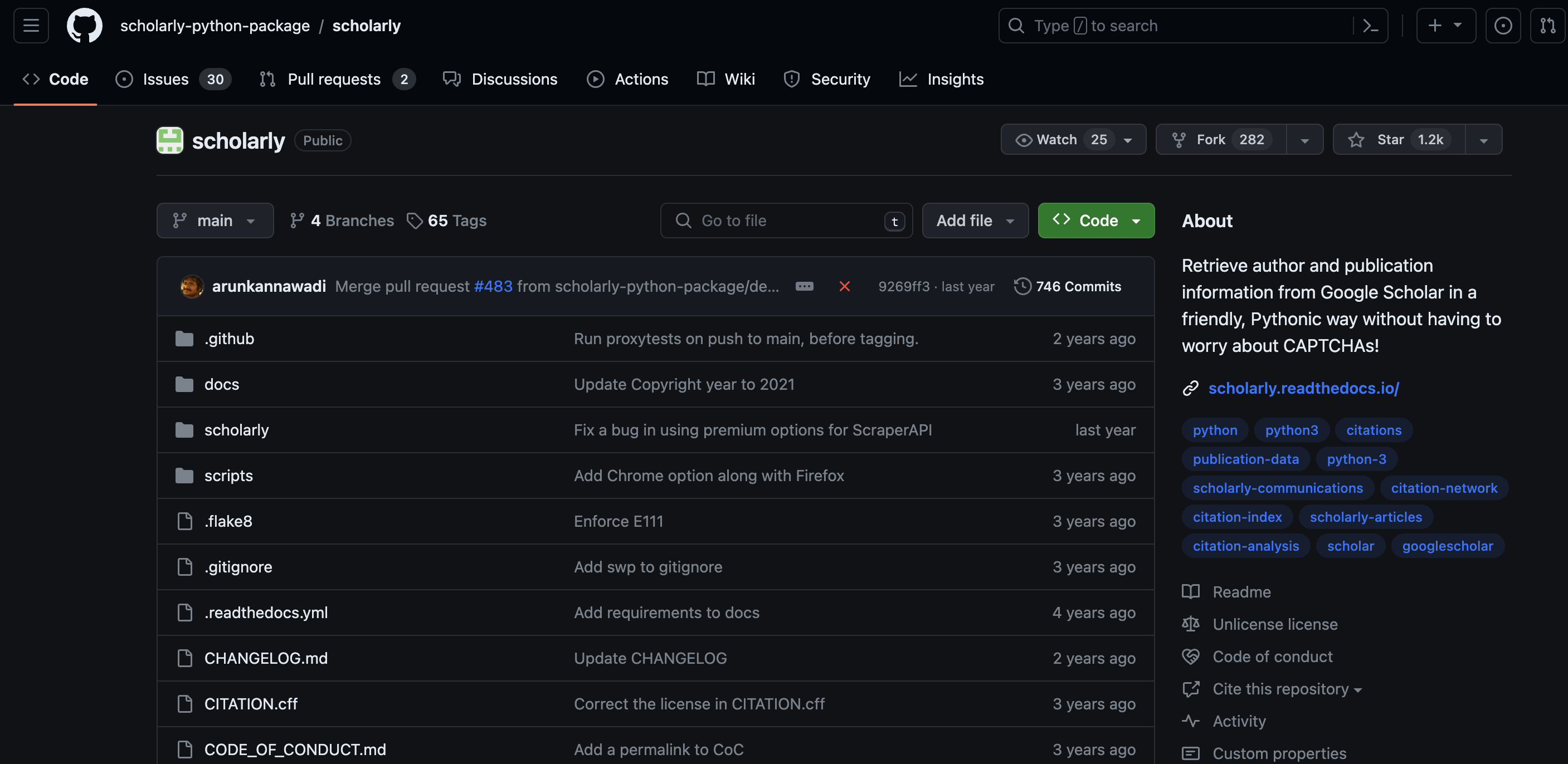
The open-source solution. This Python package is a tool that allows you to search for academic publications, research papers, authors, and other scholarly content on Google Scholar and retrieve detailed information about publications, including titles, authors, publication dates, citations, and more. You can perform advanced searches and queries to find specific academic content based on keywords, authors, publications, and other criteria. One caveat is that Google Scholar has a request rate limit. So in order to avoid getting blocked, this solution has to be combined with proxies.
4. ScaleSERP Google Scholar API
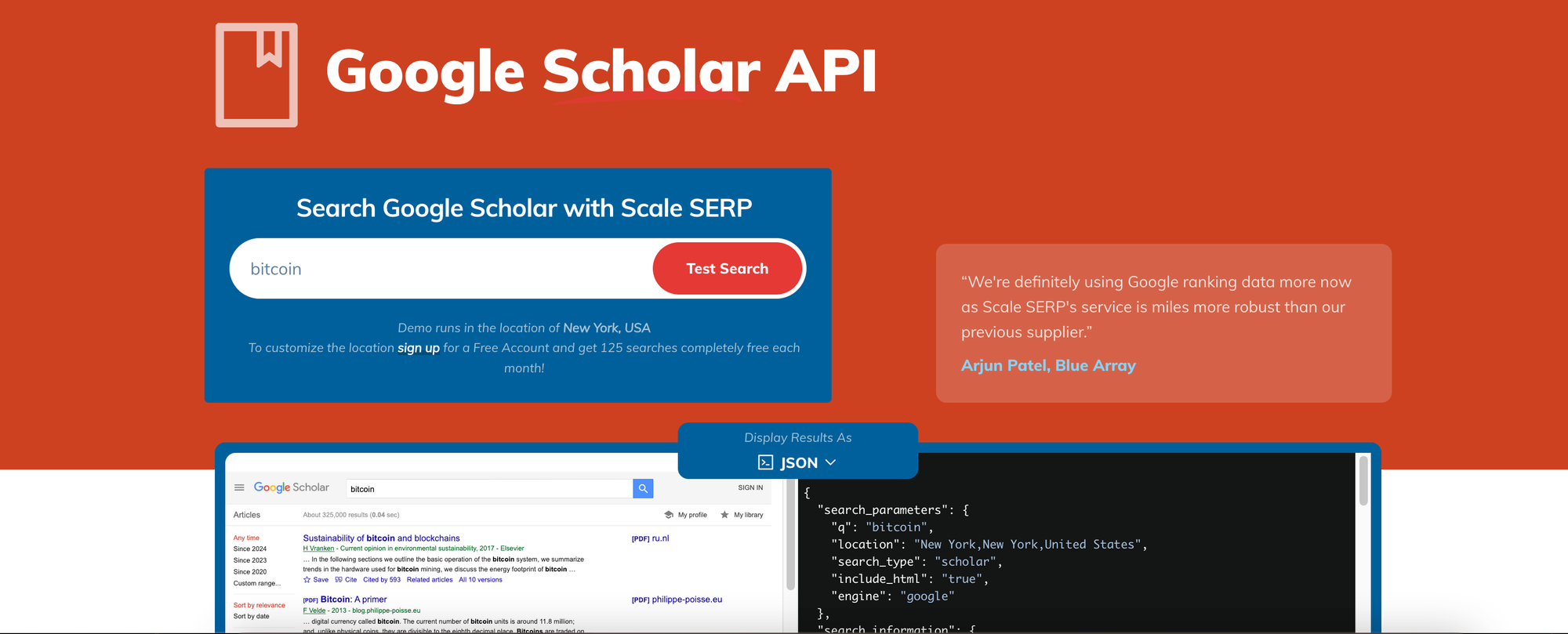
The languages solution. This scraper API can retrieve information like article titles, authors, scholarly articles, citations, and publication details in 3 different languages: Node.js with Axios. Python, and PHP. You can also use simple curl and HTTP requests with API Endpoints. You can download the information in JSON or CSV format.
5. Serpdog Google Scholar API
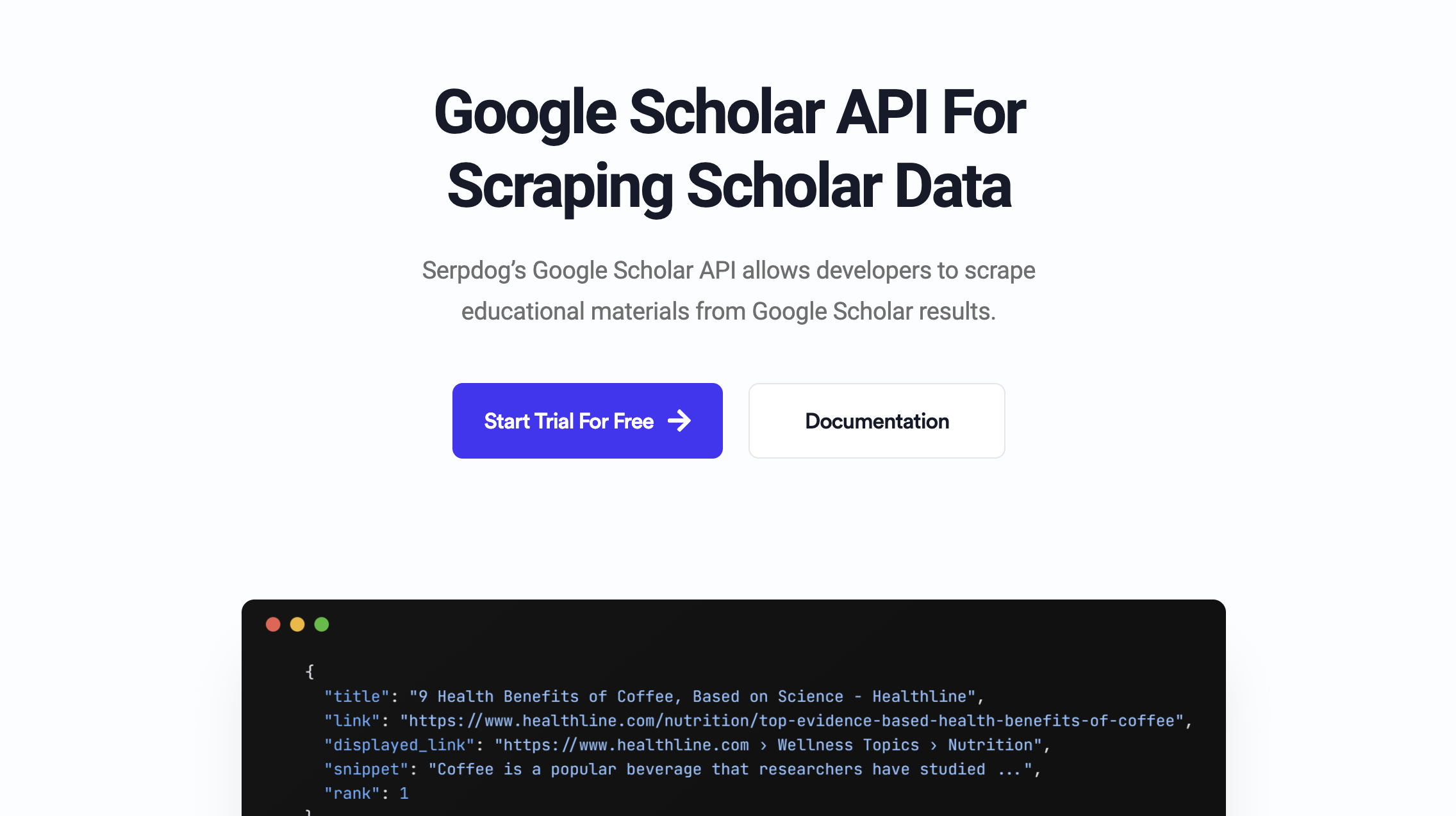
The quick solution. With this Google Scholar API, you can search for specific publications and retrieve citation details, titles, authors, publication sources, and related links to access publication metadata such as additional versions and citations of the papers. You can send API requests in Ruby, PHP, Java, Python, NodeJS, and cURL. Pricing starts at $30 to $200 with monthly and yearly plans and covers from 8K to 130K Google credits. You can export Google Scholar results in HTML and JSON.
Note: This evaluation is based on our understanding of information available to us as of November 2024. Readers should conduct their own research for detailed comparisons. Product names, logos, and brands are used for identification only and remain the property of their respective owners. Their use does not imply affiliation or endorsement.
❓FAQs
Can you use Google SERP API as Google Scholar API?
Same as Google Search and Google Scholar are two different search engines, Google SERP API (also called Google Search API) and Google Scholar API are two distinct Google APIs with different purposes and functionalities. If you're interested in learning about our top picks for SERP APIs, check out this article.
Do you need proxies for scraping Google?
Proxies are essential for web scraping in general, but for scraping Google in particular, using the right proxies is crucial. When extracting data from Google's search results, it's highly recommended to use specialized Google scraping proxies, they are called SERP proxies. These are built specifically for obtaining SERP data, ensuring you can gather information from Google and other websites efficiently and without disruptions. Read more about types of proxies in this guide.
When it comes to scraping Google Scholar, general proxies should be enough to avoid getting blocked. If that's not the case, we have a dedicated article on how to crawl a website without getting blocked.
What scraped Google Scholar data can be used for?
The best part of this search engine is that Google Scholar results only include organic results; no ads there. So you can be sure scraped Google Scholar data can be reliably used for various purposes, especially in such serious matters as research and academic contexts. Here are some potential uses for scraped data from Google Scholar:
Academic research. Researchers can analyze publication trends, citation patterns, and the impact of different authors or journals in specific fields.
Literature reviews. Automating the collection of articles for literature reviews can save time, especially in fields with vast amounts of published research.
Data analysis for libraries. Libraries and educational institutions might analyze publication trends to inform their collection development strategies.
Market analysis. Academic institutions can use publication data to identify emerging trends, key researchers in a given research topic, and institutions in specific technological or scientific areas.
Personalized recommendation systems. For academic content platforms, scraped Google Scholar data like Google Scholar authors can help in building systems that recommend relevant articles or researchers based on user interests.
Networking and collaboration. Identifying researchers with similar interests for potential collaborations or understanding the network of research in a specific field. Citation data from Google Scholar API can be used to identify faculty members who share the same academic interests and collaborate on the same projects.
What are the other websites like Google Scholar?
If data from Google Scholar is too general for you, there are several alternatives to Google Scholar for accessing academic literature and research papers. Each of these platforms has its own strengths and might be more suitable for certain types of research or fields of study:
PubMed. A free search engine with open-access research papers primarily for life sciences and biomedical topics. It includes over 30 million citations for biomedical literature from MEDLINE, life science journals, and online books.
Microsoft academic. A free public web search engine for academic publications and literature, offering a unique approach to searching through academic resources with semantic search capabilities.
Bielefeld academic search engine. Hosted by the Bielefeld University Library in Germany, BASE has been developed with an emphasis on providing comprehensive access to scientific documents and resources, both published and in open-access repositories.
Scopus. A comprehensive abstract and citation database covering a wide variety of research topics across scientific, technical, medical, social sciences, and arts and humanities disciplines.
Web of science. A multidisciplinary citation database, providing access to scholarly literature across sciences, social sciences, arts, and humanities. It is known for its citation analysis and research impact tools.
JSTOR. A digital library for academic journals, books, and primary sources. It covers a wide range of disciplines but is particularly strong in the humanities and social sciences.
arXiv. An open-access repository of electronic preprints (eprints) approved for posting after moderation, but not peer-reviewed. It is popular in fields like physics, mathematics, computer science, quantitative biology, quantitative finance, and statistics.
IEEE Xplore: A digital library providing access to publications in electrical engineering, computer science, and electronics. It includes IEEE journals, transactions, letters, and magazines.
SSRN (Social Science Research Network). A repository for research in the social sciences and humanities, including economics, law, corporate governance, and anthropology.



